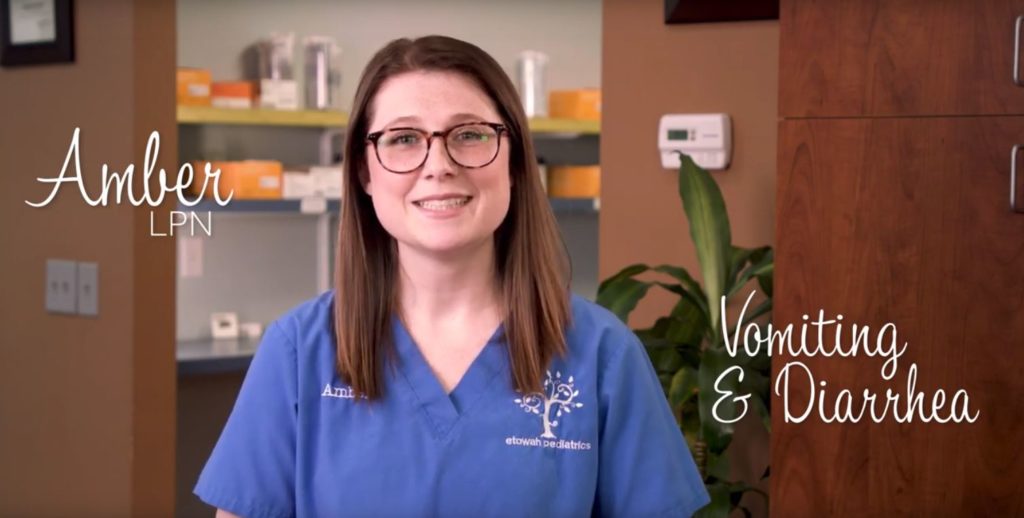Hey guys! I just want to talk to you today a little bit about vomiting and diarrhea. You know those two things can be caused by either a virus or a bacteria, so the treatment for both are very different.
You’ll want to treat vomiting by keeping your child from eating or drinking anything for at least four hours after the vomiting starts. After four hours, you can start to introduce clear fluids that contain electrolytes like Pedialyte, sugar-free Gatorade, and even some broth. After four hours of tolerating that, they can have something like toast, a banana, something very bland to keep on their stomach. If they’re tolerating that well, then you can start to try to move to their normal diet about 24 hours after the vomiting starts. After the vomiting subsides, you’ll still want to be wary of acidic foods, greasy foods and fried foods.
If at any point during that course they start vomiting again, you’ll need to back up and go nothing by mouth for four hours.
The treatment for diarrhea is a lot different. You’ll need to start with a high-protein diet – things like peanut butter, chicken, and beef. You’ll want to stay away from those carbs like vegetables, fruits, and breads. Also, the diarrhea should not last more than three days and it should not contain any mucous or any blood. If it does, then you’ll need to call our office immediately. Something underlying may be going on. Also, if your baby under six months of age is having vomiting or diarrhea, you’ll need to call us as soon as possible because that can be indicative of other things.
Something else you want to watch for is their dehydration status. Babies will get a sunken fontanelle, which is their little soft spot on the top of their head. If that becomes sunk in, that means they’re dehydrated and that’s an emergency, so you’ll need to call us or go to the emergency room.
For older kids, if they aren’t crying whenever they get upset, or if they’re not peeing enough, at least one time within six hours, that’s usually our limit. If they’re not peeing by the end, you’ll need to call us and bring them in.
Also, you’ll want to watch for those fevers. it’s not uncommon for babies to run fevers whenever they have vomiting and diarrhea, especially with that nasty tummy bug, but if it does get over 100.4 you can always call us. That’s just low-grade. If it’s above 102, then that’s something more serious and we’ll need to see them in office.
Call the office right away if:
- Fever is over 102* for vomiting
- Fever is over 101* for diarrhea
- Vomiting lasts longer than 24hrs
- Diarrhea lasts longer than 3 days
- Accompanied by severe constant abdominal pain
- Stomach is tender to the touch
- Blood or mucus is present in the vomit or diarrhea
- Signs of dehydration:
- No tears
- Dry diaper or no urination for 6 hours
- Dry mouth, skin, or lips
- Sunken eyes
- Not as alert as usual
- Sunken soft spot on head (for infants)
Medicines to avoid
Children should not be given medicine for diarrhea such as Pepto Bismal or Lomotil unless your child’s provider recommends it. Diarrhea is the body’s natural way to rid itself of the virus causing symptoms.
Mild dehydration
Most cases of mild dehydration can be treated by giving your child fluids. Small children and babies may require syringe feedings of an oral hydration solution, such as Pedialyte. If dehydration is severe, your child may need to be given fluids through an IV (a tube inserted into a vein). To lower the chance of dehydration, call your child’s doctor early if your child has vomiting or diarrhea that won’t go away.


